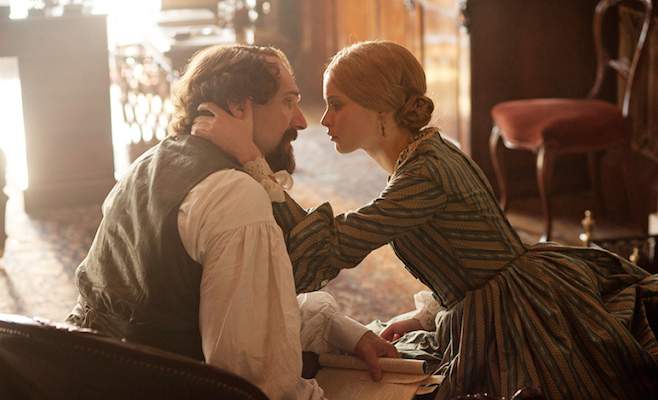The Invisible Woman
What the Dickens is a 19th-century mistress to do?
Overview
If behind every great man there is a great woman, then consider Charles Dickens marked by two: his wife and mistress. The speculative The Invisible Woman tells the tale of the latter, wooed by the author despite their 27-year age difference, yet the former is inescapable. History remembers their imperfections, but understanding reigns in their screen incarnations. One stayed in the shadows as his lover and muse; the other stood on the sidelines as the mother of his ten recognised children.
Treading the boards as a fledgling actress with her mother (Kristin Scott Thomas) and sisters (Perdita Weeks and Amanda Hale), Ellen 'Nelly' Ternan (Felicity Jones) catches the eye of Dickens (Ralph Fiennes) as he stages The Frozen Deep. Social decorum frowned upon divorce and threatened to keep them apart, but their love lingered, the open secret of their affair gaining traction before becoming untenable. Years later, Nelly looks back on their tumultuous relationship.
Dickens is the high-profile figure in the handsomely staged and sumptuously expressed period drama, yet his presence is secondary to the women at the mercy of his emotions. As a writer, he remains as prominent as his many novels; in his personal life, his flitting from his wife, Catherine (Joanna Scanlan), to Nelly makes him the least interesting character. Instead, the pains suffered by both drive a film that skirts the melodrama inherent in its content. Troubled and tenacious in their individual ways, each could earn the description of the feature’s title.
The intrigue elicited by Catherine and Nelly over Dickens is by design, and not indicative of any failings in the film’s performances or construction. Adapting Claire Tomalin's book The Invisible Woman: The Story of Nelly Ternan and Charles Dickens, Fiennes does double duty as director in a deftly delicate addition to his filmmaking resume (and a stark departure from his last effort, the brutal modernising of William Shakespeare’s Coriolanus).
Underplaying his lead role but always attracting attention, Fiennes is similarly subtle and deliberate on screen as he is off; however, again it is his surrounding players that rise to prominence. Tackling Nelly’s uncertainty in her younger years as well as her guarded exterior as she ages is no easy feat but one that Jones portrays admirably, building upon her stellar turns in Like Crazy and Breathe In. Scanlan is given less time to impress but makes the most of her moments, conveying the devastating mood that trickles through the entire production.
As The Invisible Woman progresses towards its fated conclusion, of course the air thrums with contemplation. Abi Morgan’s screenplay and the film that results makes audiences feel but also think: about life, love, social convention and struggling with normality amidst bright minds and great expectations.





